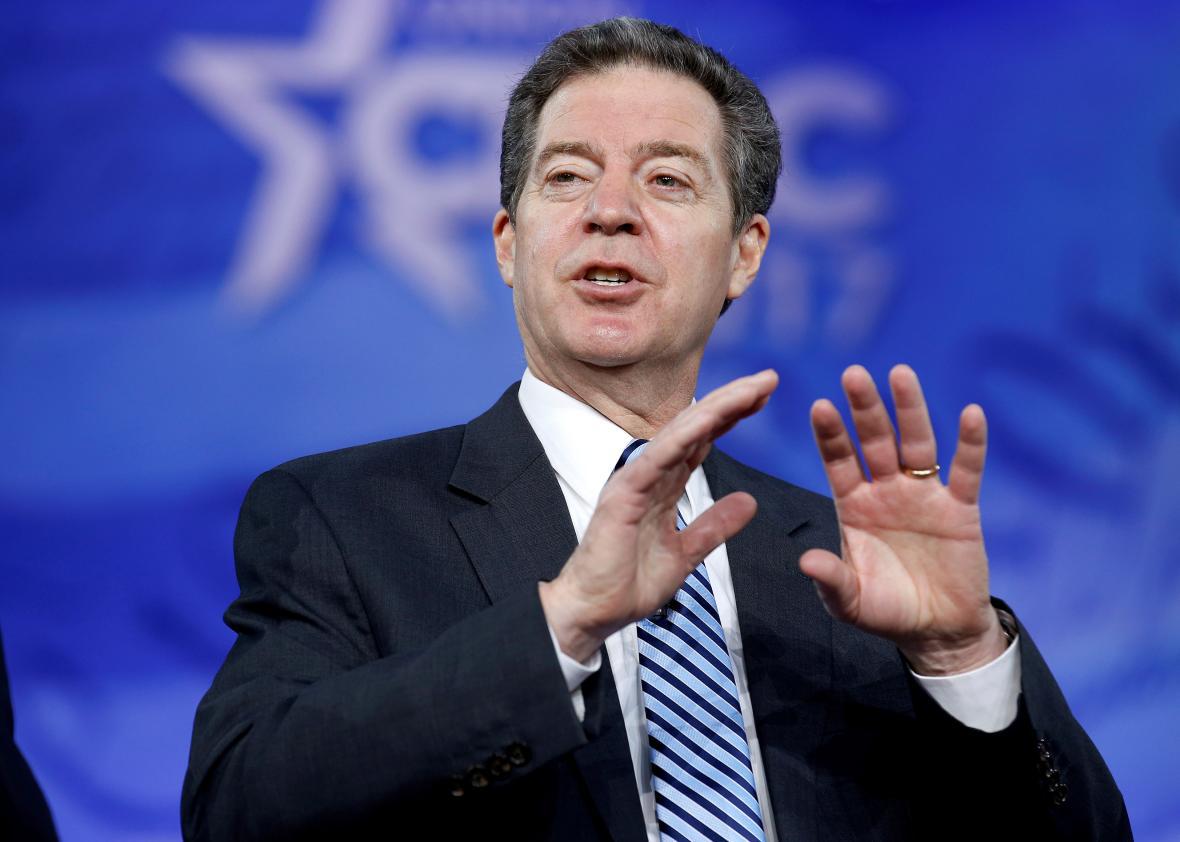Thanks to the state of Kansas, we now get to find out whether Republicans are capable of learning from their failures.
On Tuesday, lawmakers in Topeka finally ended their costly misadventure in supply-side economics, when the GOP-dominated Legislature voted by wide margins to override a veto by Gov. Sam Brownback and reverse the massive tax cuts he championed in 2012. Kansas has faced chronic budget deficits and struggled with disappointing job growth during the half-decade since Brownback signed the reductions into law—a grinding fiscal disaster that turned the state into a poster child for conservative policy thinking gone awry and gradually stirred a rebellion among members of the governor’s own party. They were finally spurred to act by a $900 million, two-year shortfall, as well as a Kansas Supreme Court ruling that ordered the state to revamp the spending formula for its underfunded public schools.
Brownback’s tax cuts were sold as a way to generate jobs and new business while transforming Kansas into a national showcase for conservative policymaking. They were dreamed up with the help of Art Laffer, the supply-side maven famous for the Laffer curve, and Stephen Moore, the Club for Growth founder who in recent years has evolved into a media-friendly pied piper of obviously misguided conservative economic dogma. On their advice, Brownback slashed the state’s personal income tax with the goal of gradually reducing it to zero. But more fatefully, he entirely exempted from taxes profits earned by certain businesses, known as “pass-through” entites—a move that turned into a quick and obvious debacle.
Pass-throughs are sometimes misleadingly described as “small businesses.” In reality, they account for more than 90 percent of all U.S. businesses—including everything from your corner gas station to massive hedge funds, Koch Industries’ various tentacles, and the Trump Organization. What they all have in common is that, instead of paying taxes on the corporate level like Walmart or Apple, pass-throughs simply distribute their profits to their owners, who then pay taxes on them as normal income. There was no particular reason to give them a special break, particularly since it would create many opportunities for wealthy Kansans to game the system, either by restructuring their businesses to avoid taxes, or by claiming that their salaries were actually tax-free business “profits.”
Which is pretty much exactly what unfolded. Last year, a group of researchers from Indiana University, the University of South Carolina, and the U.S. Treasury examined Brownback’s tax cuts and concluded there was scant evidence they had led to any additional economic growth. Instead, the “primary effect of the policy” was to cost the state tax revenue by encouraging business owners to relabel their earnings as business profits. The budget fallout was so bad that economists from the conservative Tax Foundation warned Kansas legislators that their ill-considered experiment was hurting the cause of “tax reform”—i.e. tax cuts—nationwide.
Those lawmakers finally seem to have listened. Their new tax hike, which is expected to raise $1.2 billion over two years, undoes the pass-through exemption.
The question is whether national Republicans will take notice. Even though Kansas has been a readily apparent disaster for years now, that has not dampened Republicans’ enthusiasm for cutting rates on pass-throughs. Trump, who was advised during his campaign by Moore, has proposed a 15 percent rate on pass-throughs, which would be a bit like the Kansas policy on meth. Less widely known, but perhaps more importantly, House Republicans including Speaker Paul Ryan have proposed a 25 percent rate for pass-throughs. Either would be immensely expensive, which could make it difficult to slip into a final tax reform package. But the idea is very much out there and alive.
Kansas has admitted its mistake—and Washington may try to repeat it anyway.
